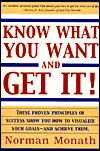
A knowledge of basic psychology can be extremely useful in giving us insights into our psyches so that we can learn our true needs. Anne Miller, a friend of mine, was a mother of five children when she started studying psychology on her own. From this she learned that she wanted to become a lawyer, and did so. Today she is a full partner in a very successful law firm that specializes in criminal law, and her friends continue to be amazed at her accomplishment.
They thought Anne was doomed to remain in the kitchen for the foreseeable future, particularly since the children were small when she started law school. However, once she knew what she wanted, she was able to get her husband's full cooperation in helping out domestically so that she was able to become a law student without neglecting the needs of the children.
Of course, anyone who has undergone psychoanalysis or psychotherapy with good results must certainly have been made aware of his or her basic wishes. However, if you did not have that experience, I believe that if you were to read a few basic books on psychology you would find them just as helpful as my friend Anne Miller did.
Learning Your True Needs by Interpreting Your Dreams
Another subject that is worth looking into is the interpretation of our dreams. In the song entitled "Wishing Will Make It So" by B. G. de Silva, we are told that the wishes we make while we're awake are the equivalent of the dreams we dream while we're asleep. Dreams are very often the wishes we wish while we're asleep, and a knowledge of their meaning can unlock many doors in our search for self-knowledge.
If you have difficulty in interpreting your dreams, you might ask a close friend to help you. It may be easier for someone who knows you fairly well to arrive at the true meaning of your dreams because you may be repressing what you may not want to face about yourself. Dreams are a convenient way to express whatever we may be trying to hide from ourselves, so we sometimes concoct scenarios that seem to defy analysis. We do this mainly in order to protect ourselves from feelings of guilt or anxiety. However, some of our close friends may not be fooled by the symbols we use in our dreams and may be surprisingly accurate in explaining what they mean.
One of the clearest explanations of what dreams are is in The Meaning of Your Dreams by a dear friend of mine, Valerie Moolman. Valerie says:
The format of the dream is necessarily a little different from that of the waking thought. With the conscious mind turned off, our use of language is restricted. We dream-think nonverbally, for the most part, which restricts both the presentation and the subject matter. Instead of articulating words, we see pictures. Instead of becoming aware of concepts or abstractions entering our heads, we see shapes symbolic of those thoughts appearing as if on a screen in front of us or on a stage around us. If an idea is incapable of presentation in this manner, with perhaps a little assist from sound or emotional coloring, we simply don't dream about it.
The pictures we see represent our thoughts; the symbols (in the form of people, creatures, houses, objects and so on) are representations of our abstract ideas or conceptions. Each dreamer creates his own story, plots it and peoples it; the emotions in it are his emotions. The actions, characters, feelings, colors, shadings, are all put there by him and only by him, although he will often call upon the most casual experiences of the day to shape the dream-stuff of the night. Even the least imaginative of us may have dreams that seem to be bizarre, yet are not. They have a superficial weirdness because we cannot readily untangle the symbolism and find out what it is that we are talking to ourselves about at night. The night thoughts are really hidden daytime thoughts brought out of hiding by our sleeping minds -- and yet not brought altogether out of hiding or the shock of recognition might awaken us.
The thoughts that occupy us are not mere trivia, either. We do not dream of things for which we have absolutely no concern; we dream of deeply rooted problems, of secret wishes that demand fulfillment, or conflicts that matter to us very much. Even when a dream appears ridiculous -- particularly then -- it is a representation of something that is troubling us. Neither does it come simply to annoy; it parades the facts before our eyes and quite often offers solutions to the very problems it presents.
Dreams: An Expression of Our True Self
From time to time people tell me to stop dreaming and wake up to reality. The truth is that very often my dreaming is the reality, whereas the so-called reality is nothing more than an act -- an act of going through whatever emotions I feel will help me accommodate to the pressures of society. In other words, the reality is a sham -- an act of hypocrisy -- while the dream is an expression of my true self, my true longings, my innermost wishes.
The point is this: There may be times when it is kinder and more humane to play a part than to use truth as though it were a deadly weapon. However, when we do shade the truth, we must be sure we are fully aware that we are doing so. Otherwise, there is a danger that we might end up deluding ourselves and become confused about what we want out of life.
Seeing What We Wish Were There
 You've heard the expression "Beauty is in the eye of the beholder." Whenever I hear it, I always think of how difficult it is to see things as they are instead of as we wish they were. In personal relationships, this can cause serious problems. For example, suppose you have an image in mind of the kind of person you want for a companion, or lover, or spouse.
You've heard the expression "Beauty is in the eye of the beholder." Whenever I hear it, I always think of how difficult it is to see things as they are instead of as we wish they were. In personal relationships, this can cause serious problems. For example, suppose you have an image in mind of the kind of person you want for a companion, or lover, or spouse.
Let's say that there are five or six attributes that are especially important for that person to have in order to measure up to your ideal. One attribute might be a love for classical music, or golf, or horseback riding; another might be a certain kind of taste in clothes or food, etc. Now, along comes someone who has three of the five or six attributes you are seeking. Instead of recognizing that, you bestow all the remaining attributes on that person; you are so eager to find your ideal that you prematurely end the search by hypnotizing yourself into thinking you have found all that you wanted.
The result is that six months or a year later you wake up and say, "What did I ever see in him/her?" The answer: You saw what you were looking for -- what you wanted to see -- not what was really there.
Fooling Ourselves Into Thinking We Have What We Want
In the same way that we can delude ourselves about people through our impatience, anxiety, or overpowering inner longings, we can fool ourselves into thinking we have what we want in other areas -- the job we have, the house or apartment we live in, the part of the country we live in, etc. While we may be temporarily content in this act of self-delusion, eventually we find that a feeling of malaise begins to appear and starts escalating into deep unhappiness.
How do we prevent this from happening to us? Once again, by testing ourselves as to our preferences in dealing with the minutiae in our lives. It is those seemingly minor matters that get us into the habit of taking things for granted and getting into a rut. But once we question whether we like the sound of our doorbell, for instance, we are on the road to examining our preferences in matters of greater significance.
Learning to Live in The Present -- Not the Past or the Future
Another very important habit we must develop, if we are to know what we want, is to try to live in the present instead of the past or the future. That may sound strange at first, but if you think about it, you may agree that it makes sense.
When I first came across that idea, I began to notice how many of us live in either a state of reminiscence or a state of anticipation about the future, instead of being fully conscious of the present, the moment at hand. Reminiscence and anticipation can be very important components in bringing satisfaction and happiness into our lives, but overemphasizing either, or both, brings about an unfortunate result: we end up wondering why time seemed to fly by too quickly for us to have done what we wanted to do; we end up with a feeling that life has passed us by.
On the other hand, if we continually impress ourselves that the present -- the moment of consciousness -- is the most important moment in our lives, we won't let it slip by carelessly but will savor it for what it is worth and for how we might take advantage of it. "Seize the day" is a well-known expression, but the best preparation for doing that is to get into the habit of seizing the moment at hand.
Staying Focused on the Moment at Hand
The next time you find yourself spending fifteen to thirty or so minutes with someone, ask yourself how much of that time you spent thinking about things that had already happened, or were going to happen later on. I am not referring to actual conversations about the past or future. For example, if the other person asked what you ate for breakfast the day before, your answer will involve the past although your mind can be concentrated on the conversation taking place.
I am referring to a situation where you may be having a conversation about the weather, or your job, and while it is going on, somewhere in the back of your head you are thinking about an incident that took place a day or two before, or you are thinking about the date you are looking forward to the following week. You are not really focused on the moment at hand, the present moment, and that can lead to trouble.
Of course, you will always have fleeting thoughts about the past and future -- you have to as a person of intelligence with a memory and with hopes. However, there is a difference between holding the present in perspective against the background of the past and future as opposed to blurring the present because the past and future preoccupations are allowed to intrude. And it is amazing to what extent we do that. We end up missing the experience of the present and before we know it, the years go by.
Treasure the Present: It Is The Moment You've Been Waiting For
The present should be treasured. This is the moment you have been waiting for all your life. Now, while you are reading these lines, is the time you should ask yourself: Am I doing what I want to? Am I happy? Am I what I wanted to grow up to be when I was a child? If you cannot give positive answers to those questions now, what makes you think you will be able to do so later on? Perhaps there is a good reason, but you had better search for it right away if you don't know it now.
As an exercise, try to treat each moment of the present as though it is the moment you had been waiting for all your life. As a matter of fact, it is. When you have raised your consciousness along these lines, you will regard each moment as though it were a precious jewel to be guarded with your life. Then you will find yourself listening better, seeing more clearly, living a life of greater satisfaction and gratification, even through periods of grief. For then you will be controlling your thoughts, learning what it is you really want, taking your life in hand and wishing for the right things at the right time and with the right intensity.
Reprinted with permission of the publisher,
Tom Doherty Associates, LLC. ©1984, 2002. www.tor.com
Article Source
Know What You Want & How To Get It!
by Norman Monath.
 Through the many bestselling inspirational and self-help books he published, Monath learned all the top techniques for achieving success. Here he shows you how to make them work by:
Through the many bestselling inspirational and self-help books he published, Monath learned all the top techniques for achieving success. Here he shows you how to make them work by:
- Determining what you really want; - Attracting good luck; - Putting the intellectual strength of others to work for you; - Concentrating on the present moment; - Thinking three-dimensionally; - And much, much more . . .
Info/Order this book.
About the Author
 Norman Monath was a publishing executive in New York at Simon & Schuster, and was the founder of Cornerstone Library, a large non-fiction house in the 60s, 70s, and 80s. An acclaimed musician and teacher, Monath wrote an instructional workbook entitled How to Play Popular Guitar in 10 Easy Lessons (Fireside, 1984), an easy-to-follow program for mastering the guitar in a matter of weeks. The book is in its 43rd printing having sold over 300,000 copies. Norman Monath was born on July 3, 1920 in Toronto, Canada and raised in New York City, NY. He died December 26, 2011 at JFK Hospital in Atlantis, FL.
Norman Monath was a publishing executive in New York at Simon & Schuster, and was the founder of Cornerstone Library, a large non-fiction house in the 60s, 70s, and 80s. An acclaimed musician and teacher, Monath wrote an instructional workbook entitled How to Play Popular Guitar in 10 Easy Lessons (Fireside, 1984), an easy-to-follow program for mastering the guitar in a matter of weeks. The book is in its 43rd printing having sold over 300,000 copies. Norman Monath was born on July 3, 1920 in Toronto, Canada and raised in New York City, NY. He died December 26, 2011 at JFK Hospital in Atlantis, FL.
Books on Success from Amazon's Best Sellers list
"Atomic Habits: An Easy & Proven Way to Build Good Habits & Break Bad Ones"
by James Clear
This book offers practical strategies for building good habits and breaking bad ones, with a focus on small changes that can lead to big results. The book draws on scientific research and real-world examples to provide actionable advice for anyone looking to improve their habits and achieve success.
Click for more info or to order
"The 5 AM Club: Own Your Morning, Elevate Your Life"
by Robin Sharma
In this book, Robin Sharma offers a blueprint for success based on his own experiences and insights. The book focuses on the importance of starting your day early and developing a morning routine that sets you up for success in all areas of your life.
Click for more info or to order
"Think and Grow Rich"
by Napoleon Hill
This classic book offers timeless advice for achieving success in any area of life. The book draws on interviews with successful individuals and offers a step-by-step process for achieving your goals and realizing your dreams.
Click for more info or to order
"The Psychology of Money: Timeless Lessons on Wealth, Greed, and Happiness"
by Morgan Housel
In this book, Morgan Housel explores the psychological factors that influence our relationship with money and offers insights into how to build wealth and achieve financial success. The book draws on real-world examples and research to provide practical advice for anyone looking to improve their financial situation.
Click for more info or to order
"The Compound Effect: Jumpstart Your Income, Your Life, Your Success"
by Darren Hardy
In this book, Darren Hardy offers a framework for achieving success in all areas of life, based on the idea that small, consistent actions can lead to big results over time. The book includes practical strategies for setting and achieving goals, building good habits, and overcoming obstacles.


























